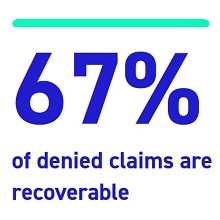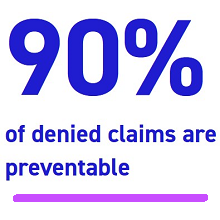Healthcare Finance: Commercial payers delay paying out claims to providersBy Thirty one-percent of inpatient claims submitted to commercial payers weren't paid for more than three months, data shows.Hospitals and health systems were optimistic about their financial performance to start the year, figuring that revenue and profit margins would rebound after a tough few years. But their financial performance has continued to struggle, and a new Crowe analysis places much of the responsibility at the feet of commercial payers, finding frequent initial claims denials and other impediments to payments to hospitals. Looking at revenue cycle analytics data from the first quarter of this year, numbers show that 31% of inpatient claims submitted to commercial payers weren't paid out for more than three months; by contrast, just 12% of claims submitted to traditional Medicare took that long. The numbers were nearly identical when looking at outpatient claims: 32 and 11%, respectively. One metric that leapt out was prior authorization and precertification denials – denials based on the payer's decision that a provider didn't get prior approval for care, or that the care wasn't necessary based on the diagnosis. The rate of these "medical necessity" denials has been rising for years, and the trend is continuing: Through the first three months of 2023, the medical necessity inpatient claim denials rate was 3.2%, compared to just 0.2% for Medicare. In 2021, the denial rate for such claims was 2.4%. While the increase may seem minor, a prior authorization/precertification denial can trigger a major fight to get paid, according to Crowe. A provider that disagrees with the denial faces a labor-intensive appeals process that might involve utilization management, nursing staff, physicians, and possibly the patient. This effort can be significant, costly, time-consuming, and difficult. And it often doesn't end with the payer making a full payment. WHAT'S THE IMPACTThe prior authorization/precertification denial category is a subset of a larger, broader metric of initial denials. Through the first quarter of 2023, commercial payers initially denied 15.1% of inpatient and outpatient claims for any reason, compared with 3.9% for Medicare over the same period. Although most initially denied claims become paid claims, the administrative effort to bring an initial denial to positive resolution is very costly for the provider, found Crowe. It requires some form of action on the part of the provider in order to receive payment for services rendered. Another claim denial category that contributes to delays in payment from commercial payers is the request for information. RFI denials occur when a payer decides not to process a claim because some type of required documentation – an attachment or signature, or a copy of the medical record – is missing. Commercial payers have 12 times the denial rate as Medicare, according to the numbers. The RFI denial rate through the first quarter of 2023 for inpatient and outpatient claims submitted by providers to commercial payers was 4.8%. It was 0.4% for traditional Medicare. A, RFI denial delays payment by at least 45 days, said Crowe, which can negatively affect cash flow and accounts receivable performance. THE LARGER TRENDCrowe examined the issue of denials through the lens of Medicare Advantage back in February. That earlier analysis found a dramatic increase in the number of inpatient claims being denied by health insurers based on the lack of medical necessity, with disputes rising in frequency among Medicare Advantage plans. Through November of 2022, the initial inpatient level-of-care claim denial rate for MA plans was 5.8%, compared with 3.7% for all other payer categories. When isolating just the payers within the MA plan population, providers wrote off 8.5% of their inpatient revenue as uncollectible in comparison to 4.7% in 2021. In 2022 alone, clients in Crowe's benchmarking database wrote off $535.4 million on account of Medicare Advantage plan denials based on lack of medical necessity.
Twitter: @JELagasse
|




